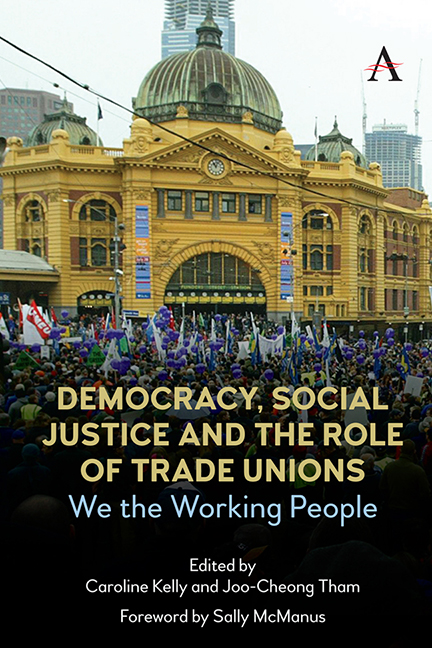Book contents
- Frontmatter
- Contents
- Foreword
- Acknowledgements
- Chapter 1 Democracy and Social Justice as Organising Principles
- Chapter 2 Economic Democracy, Workers and Unions
- Chapter 3 Nobody Owns the Future
- Chapter 4 Regulatory Approaches to the Internal Affairs of Trade Unions in Australia: From Democratic Control to Corporate Accountability
- Chapter 5 Trade Unions and the Regulation of Election Funding: Between Libertarianism and Egalitarianism
- Chapter 6 Trade Unions and Precarious Work: In Search of Effective Strategies
- Chapter 7 ‘Is There an App for That?’ Worker Representation, Unions and the Gig Economy
- Chapter 8 Temporary Migrant Workers and Trade Unions in Australia: A Complex Relationship
- Chapter 9 Unions, Fossil Fuel Exports and a Just Transition
- Chapter 10 Trade Agreements, Labour Rights and Democracy
- Chapter 11 Trade Unions, Labour Law and Democratic Socialism: The COVID-19 Crisis in the United Kingdom
- Notes on Contributors
- Index
Chapter 7 - ‘Is There an App for That?’ Worker Representation, Unions and the Gig Economy
Published online by Cambridge University Press: 18 November 2021
- Frontmatter
- Contents
- Foreword
- Acknowledgements
- Chapter 1 Democracy and Social Justice as Organising Principles
- Chapter 2 Economic Democracy, Workers and Unions
- Chapter 3 Nobody Owns the Future
- Chapter 4 Regulatory Approaches to the Internal Affairs of Trade Unions in Australia: From Democratic Control to Corporate Accountability
- Chapter 5 Trade Unions and the Regulation of Election Funding: Between Libertarianism and Egalitarianism
- Chapter 6 Trade Unions and Precarious Work: In Search of Effective Strategies
- Chapter 7 ‘Is There an App for That?’ Worker Representation, Unions and the Gig Economy
- Chapter 8 Temporary Migrant Workers and Trade Unions in Australia: A Complex Relationship
- Chapter 9 Unions, Fossil Fuel Exports and a Just Transition
- Chapter 10 Trade Agreements, Labour Rights and Democracy
- Chapter 11 Trade Unions, Labour Law and Democratic Socialism: The COVID-19 Crisis in the United Kingdom
- Notes on Contributors
- Index
Summary
Of the many challenges for trade unions around the world noted in Chapter 1 of this collection by Joo-Cheong Tham and Caroline Kelly, one of the greatest is presented by the gig economy. This form of delivering services and organising work through technology raises important questions about the nature of freedom of association – a foundational concept of the International Labour Organization – in the modern era. In Australia, the gig economy has shamelessly inverted traditional assumptions about employment regulation: that someone who performs labour is deserving of the law’s protection, unless carrying on a genuine independent business of their own. Instead, workers for platforms such as Uber, Lyft, Foodora, Deliveroo, Uber Eats, Freelancer and Airtasker are designated as independent contractors, unless they prove otherwise through legal challenges.
This contracting model is usually buttressed by arcane contracts and service agreements which use Orwellian language to obscure the reality of gig work and who is performing it. ‘Flexibility’ is held up by the platforms as a kind of holy grail, to explain gig workers being prepared to sacrifice minimum wages, unfair dismissal rights and other protections that flow from employee status. For example, Deliveroo maintains ‘that the basis of its engagement with self-employed riders is inconsistent with employment, whether full-time, part-time or casual. None of these employment relationships provide the flexibility inherent to the way in which self-employed riders work with Deliveroo.’ The contracting model has been adopted not only to absolve platforms from responsibility for minimum labour standards, but also to keep unions at bay. Most gig operators flatly refuse to engage with unions. Instead they offer insipid forms of worker voice, which they control.
This chapter examines the ways in which platforms counter unionisation, despite the clear desire for collective representation manifested by many gig workers around the world. The next section provides an overview of these issues along with the difficulties faced by trade unions in seeking to organise workers in the platform economy. This is followed by an exploration of a couple of significant recent aspects of gig work regulation.
- Type
- Chapter
- Information
- Democracy, Social Justice and the Role of Trade UnionsWe the Working People, pp. 119 - 138Publisher: Anthem PressPrint publication year: 2021



